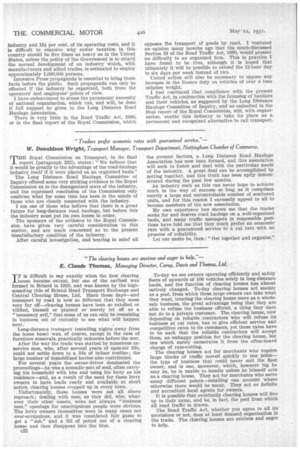"The clearing houses are anxious and eager to help."— E. Claude Thomas, Managing Director, Carey, Davis and Thomas, Ltd.
Page 94

If you've noticed an error in this article please click here to report it so we can fix it.
IT is difficult to say exactly when the first clearing house became extant, but one of the earliest was formed in Bristol in 1920, and was known by the highsounding title of Bristol Road Transport Exchange and Central Clearing House, Ltd. Since those days—and transport by road is now so different that they seem very far off—clearing houses have been so extolled or vilified, blamed or praised or merely let off as a "necessary evil," that some of us can only be remaining in business out of curiosity to see what will happen next.
Long-distance transport (entailing nights away from the home base) was, of course, except in the case of furniture removals, practically unknown before the war.
After the war the trade was started by numerous exservice men, who, after several years of open-air life, could not settle down to a life of indoor routine; the large number of demobilized lorries also contributed.
For several years the owner-driver dominated the proceedings—he was a nomadic sort of soul, often carrying his household with him and using his lorry as his residence—and, as a result of the need for these lorry owners to have loads ready and available at short notice, clearing houses cropped up in every town.
Unfortunately, these houses were not all above reproach ; dealing with men, as they did, who, whatever their other assets, were not always "business men," openings for unscrupulous people were obvious. The lorry owners themselves were in many cases not over-scrupulous, and it was considered fair game to get a "sub." and a fill of petrol out of a clearing house and then disappear into the blue.
'e32 To-day we see owners operating efficiently and safely fleets of upwards of 1.00 vehicles solely in long-distance hauls, and the function of clearing houses has almost entirely changed. To-day clearing houses act mainly as a pool, from which these large owners can take what they want, treating the clearing house more as a wholesale business, the great advantage being that they are able to refuse the business offered, a thing they dare not do to a private customer. The clearing house, now depending on reliable contractors who will refuse its business at cut rates, has to give efficient service and competitive rates to its customers, yet these rates have to be such that the reliable contractors will accept them, an unhappy position for the clearing house, but one which surely exonerates it from the often-heard charge of rate-cutting. The clearing houses act for merchants who require large blocks of traffic moved quickly to one point— the type of business that could never suit the fleet owner, and is one, moreover, which, however big he may be, he is unable to handle unless he himself acts as a clearing house. They act for merchants who serve many different points—entailing one account where otherwise there would be many. They act as definite and accredited local agents for owners.
It is possible that eventually clearing houses will live up to their name, and be, in fact, the pool from which all road traffic is drawn.
The Road Traffic Act, whether you agree to all its provisions or not, does at least demand organization in the trade. The clearing houses are anxious and eager to help.




































































































































































































